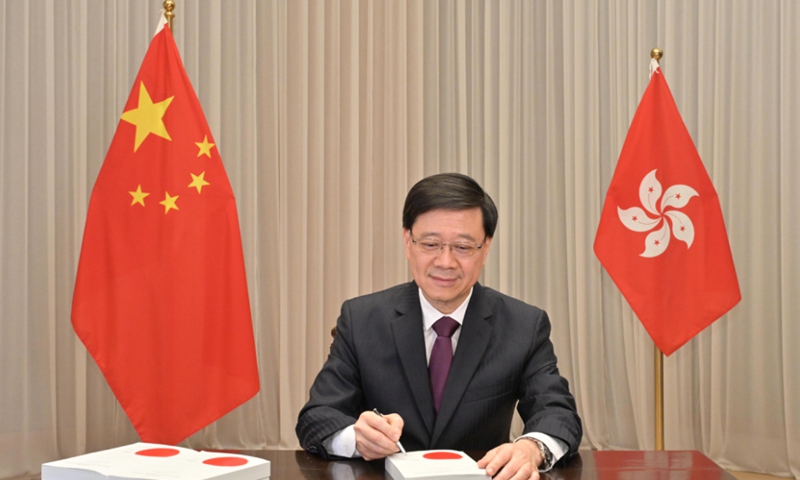
The HKSAR CE John Lee signed the Safeguarding National Security Ordinance on March 22,2024. Photo: Courtesy of the HKSAR government
The primary enforcement target under the Article 23 legislation is absconders endangering the national security who fled overseas, a Hong Kong official said.
The Hong Kong Special Administrative Region (HKSAR) Chief Executive John Lee signed the Safeguarding National Security Ordinance passed by the Legislative Council (LegCo) on Friday night, signifying that the HKSAR has fulfilled its constitutional responsibility as stipulated in the Article 23 of the Basic Law.
The long overdue local security law includes nine parts, covering offences and punishments such as treason, state secrets and espionage, sabotage endangering national security, external interference endangering national security and organization engaging in activities endangering national security.
Within the charges and penalties detailed within the ordinance, treason and insurrection carry the harshest punishments, with the maximum penalty being life in prison.
The ordinance will bring safety to society. With safety comes stability, with stability comes prosperity, Lee said as he signed into the law.
The CE also noted that a safe and stable environment is crucial to the success of businesses and enterprises, without which the private sector might suffer financial losses, and their investments and operations could be sabotaged or come under attack. Therefore, a safe and stable environment will make Hong Kong an attractive place for enterprises and investments.
The Hong Kong public warmly welcomed the ordinance, which is expected to play an important complimentary role with the National Security Law (NSL) for Hong Kong, putting an end to chaotic and social turmoil driven by both local political movement and external interference.
"Security brings prosperity," the Hong Kong Police Force (HKPF) said in a social media post on Saturday morning. The national security department of the HKPF wrote that following the law coming into force, the department will fulfill its responsibilities such as collecting and analyzing intelligence related to national security, deploying, coordinating and advancing measures and actions to maintain national security and investigating criminal cases that endanger national security.
Some local lawmakers and district councilors also shared their excitement as some said they have been waiting for this moment for a long time.
"After the HKSAR had paid a heavy price for lacking the national security protection in the past, now we can focus on pushing forward the city's economic development under the full protection [of this law] now," a local district council member Hung Kam-in told the Global Times on Saturday.
Junior Police Officers' Association chairman Lam Chi-wai, who had witnessed the bumpy road that the Article 23 legislation had gone through over the past decades, told the Global Times on Saturday that in 2003, when Article 23 was first submitted for review by the LegCo, that he was part of the Wan Chai Police District's special task force and personally witnessed the large-scale protest against it and the eventual withdrawal of the bill.
"Since then, Hong Kong has embarked on a tumultuous path, with anti-government protests escalating day by day," he said, noting that in 2019, some used the anti-extradition bill protests as a pretext for unleashing widespread violence and destruction across Hong Kong, leading Hong Kong through an indelible catastrophe.
In a society where residents have deeply reflected upon their pain, the long-awaited Article 23 legislation was finally completed after 26 years, Lam said, noting that it has become a security barrier for Hong Kong, protecting it from national security threats.
After the ordinance takes effect, Secretary for Security of Hong Kong, Chris Tang Ping-keung, stated that fugitives would be the primary enforcement target under the new legislation, and an assessment will be conducted as soon as possible to determine whether to implement the restrictions on fugitives contained within the law.
The ordinance specifies that the government can impose multiple restrictions on absconders, including canceling their HKSAR passports and suspension of qualification to practice, and providing available funds or dealing with funds related to absconders is also considered illegal.
When asked whether the new ordinance restrictions on absconders would be immediately applied to former Legislative Council members like rioter Ted Hui Chi-fung and other fugitives who have fled overseas, Tang stated that this group would be a primary enforcement target.
However, the timing of enforcement and the number of individuals targeted will be assessed as soon as possible, the official noted.
The HKPF has previously issued arrest warrants for 14 Hong Kong fugitives who have fled overseas, including Hui, Nathan Law and Agnes Chow, which had played infamous roles in instigating anti-government protests and echoing the external force in interfering in Hong Kong affairs.
In explaining the urgency of legislating the ordinance, Tang said on Saturday that some countries have been smearing Hong Kong and even intensifying their intelligence efforts, so that the national security risk remains high.
Paul Lam Ting-kwok, Secretary for Justice, also said on Saturday that criticisms from countries such as Australia, the UK, and the US on the Article 23 legislation are all too similar, lacking novelty and substance, and some are even taken out of context.
The UK has an unclear definition of national secrets and Australia's laws on foreign interference are overly broad, Lam said, noting that if Hong Kong's legal provisions are considered vague, as some Western countries said, the provisions of these countries are "extremely vague."




